Questions about Brexit?
The United Kingdom officially left the European Union on January 31, 2020, following the parties' ratification of the withdrawal agreement.
This agreement sets forth a transition period ending on December 31, 2020, during which the United Kingdom will continue to apply EU law, including social security system coordination rules, but will no longer be involved in drawing up any new European laws.
This dossier has been put together to inform you on the ongoing negotiations between the United Kingdom and the European authorities, which will have an impact on the social protection entitlements of citizens who move from one country to another.
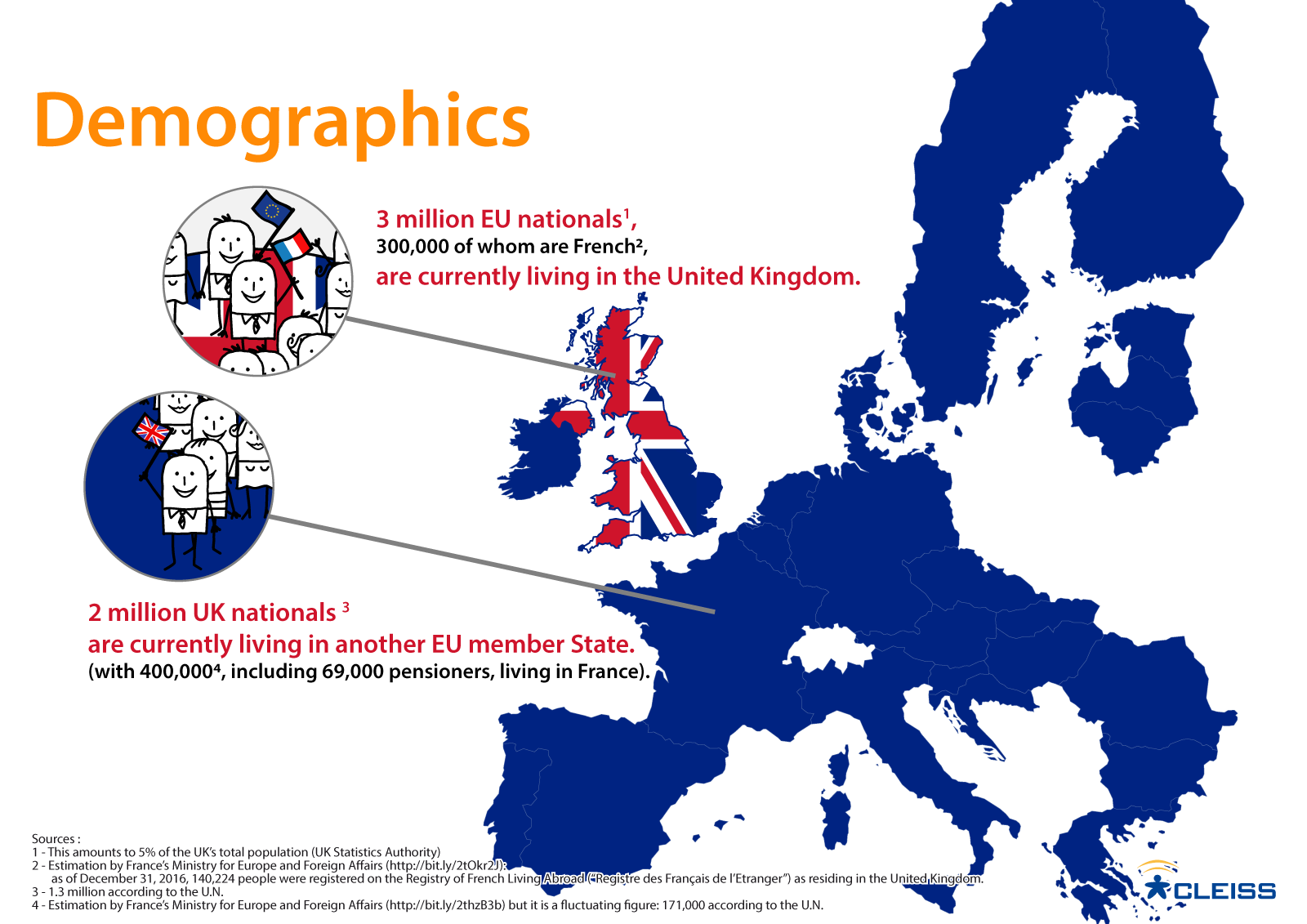 Mechanisms have been set up between the States to ensure continuity of social security entitlements for people who move from one country to another. However, this is not harmonization as each State keeps its own social security system.
Mechanisms have been set up between the States to ensure continuity of social security entitlements for people who move from one country to another. However, this is not harmonization as each State keeps its own social security system.
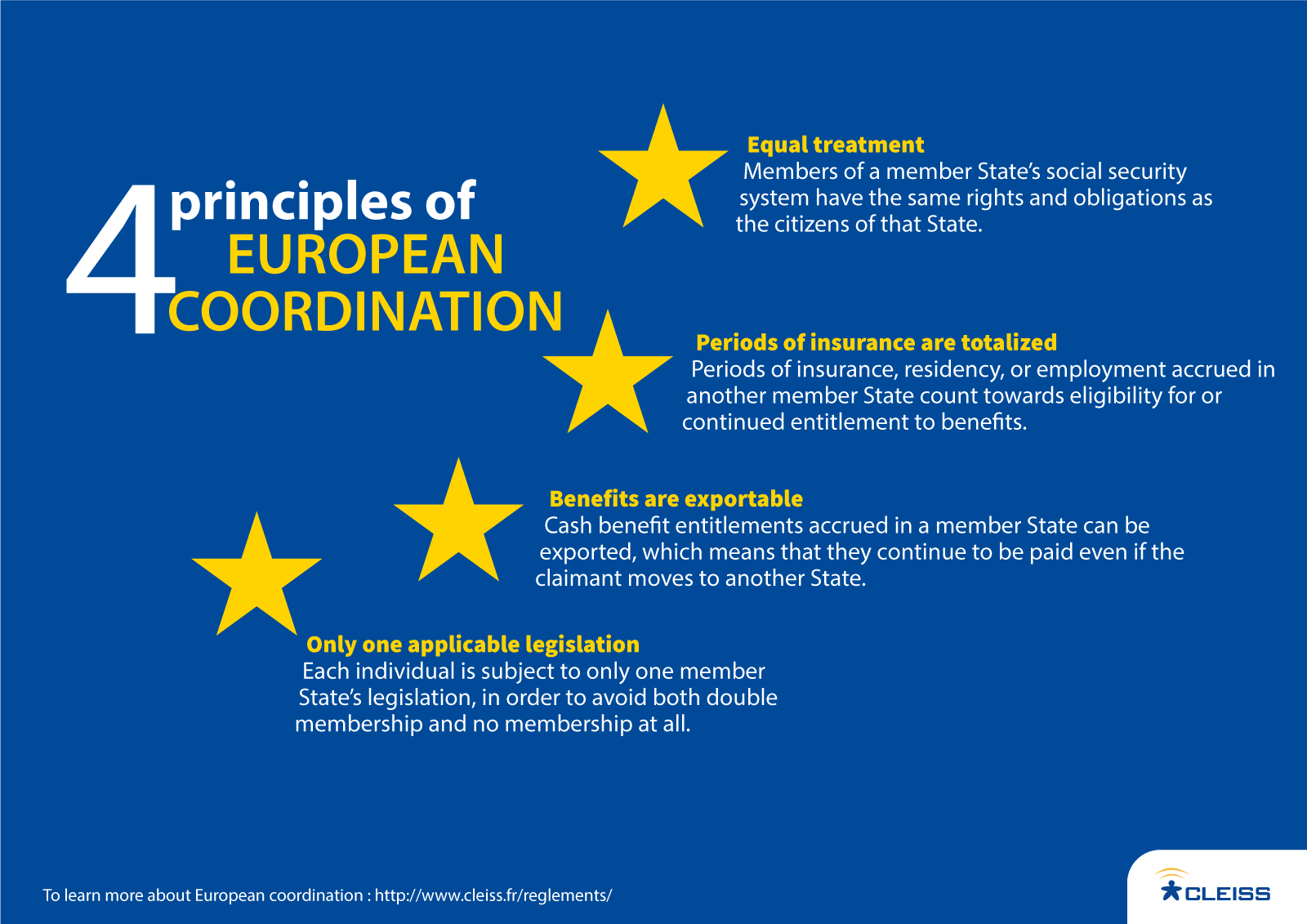 Since January 1st, 1973, which is the date it joined the European Union, the United Kingdom has applied the rules on the coordination of Social Security systems to its relations with France, as with the other European and EEA member States and Switzerland. These rules are set forth by the European regulations (EEC) No. 1408/71 and (EC) No. 883/2004 and their respective application regulations.
Since January 1st, 1973, which is the date it joined the European Union, the United Kingdom has applied the rules on the coordination of Social Security systems to its relations with France, as with the other European and EEA member States and Switzerland. These rules are set forth by the European regulations (EEC) No. 1408/71 and (EC) No. 883/2004 and their respective application regulations.
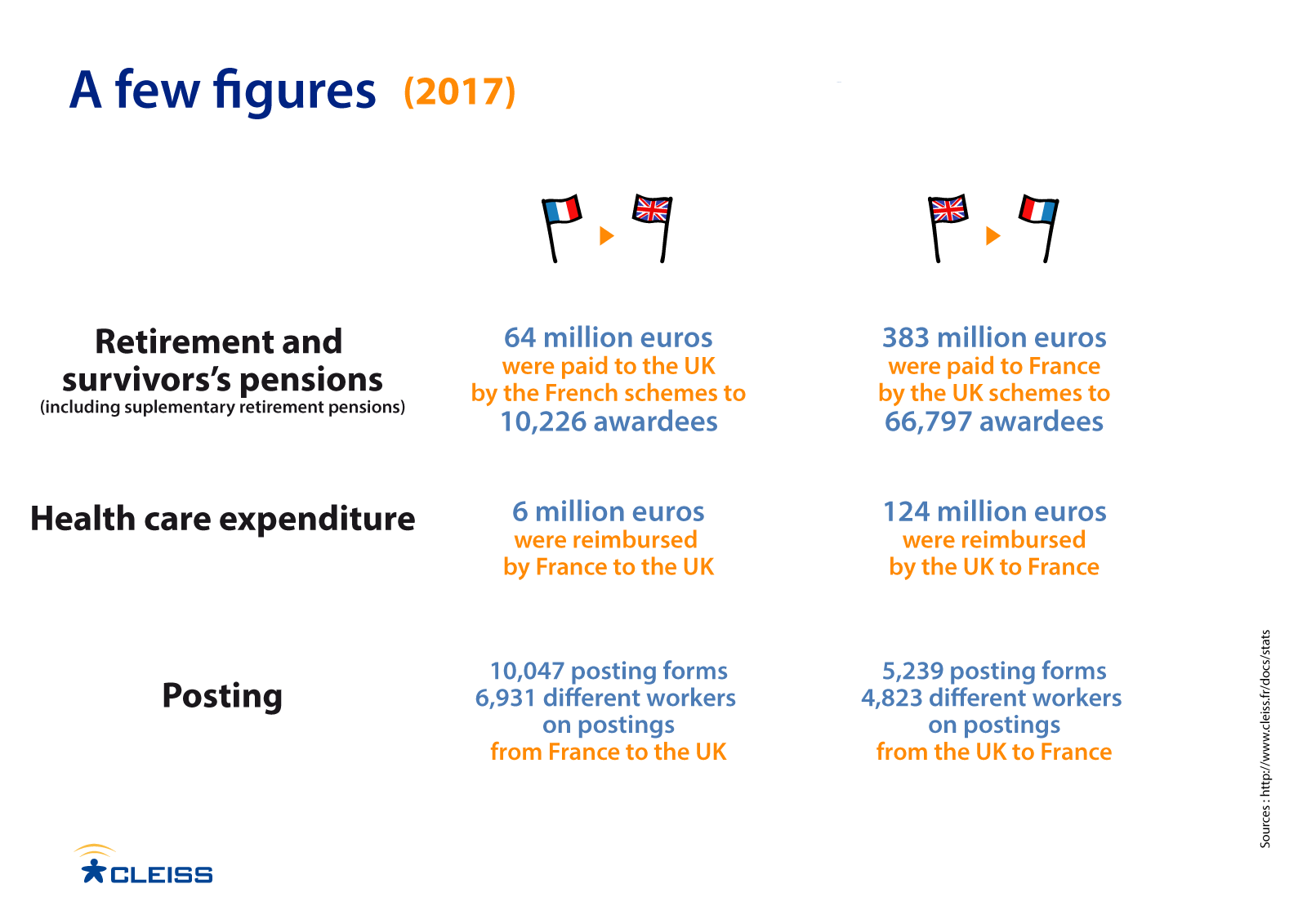
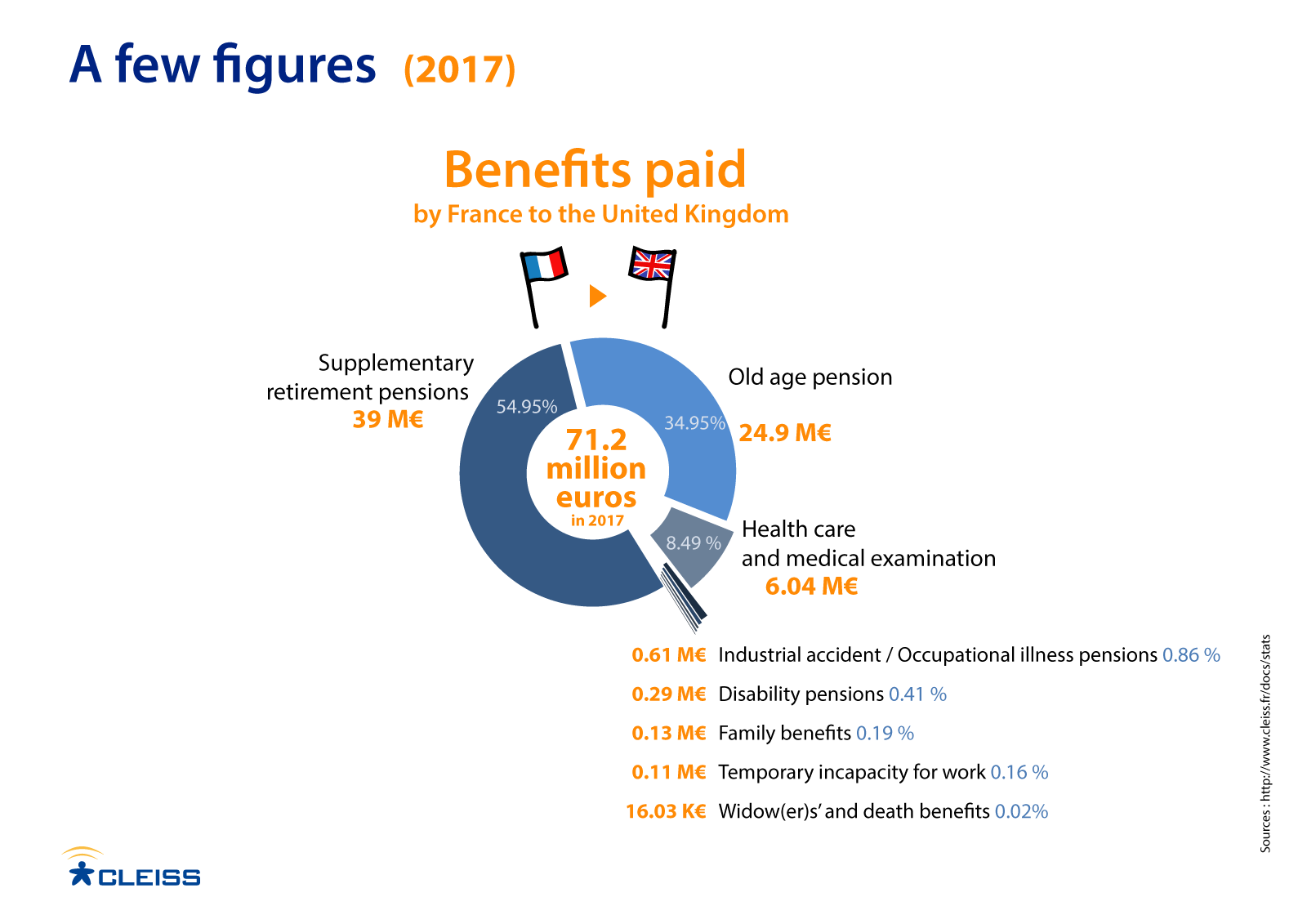 Disparities can be observed with regard to retirement and survivor's pensions. Indeed, nearly 7 times more UK pensioners are living in France than French pensioners living in the UK.
Disparities can be observed with regard to retirement and survivor's pensions. Indeed, nearly 7 times more UK pensioners are living in France than French pensioners living in the UK.
When it comes to postings, the flows are relatively balanced between workers posted from France to the United Kingdom and those posted from the United Kingdom to France.
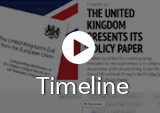 On March 29, 2017, the United Kingdom officially notified the European Council of its decision to leave the European Union, by triggering article 50 of the Treaty on European Union. This date was the starting point for the negotiation process leading to the UK's withdrawal from the EU at midnight on March 29, 2019, whether or not it had concluded a withdrawal agreement by that date.
On March 29, 2017, the United Kingdom officially notified the European Council of its decision to leave the European Union, by triggering article 50 of the Treaty on European Union. This date was the starting point for the negotiation process leading to the UK's withdrawal from the EU at midnight on March 29, 2019, whether or not it had concluded a withdrawal agreement by that date.
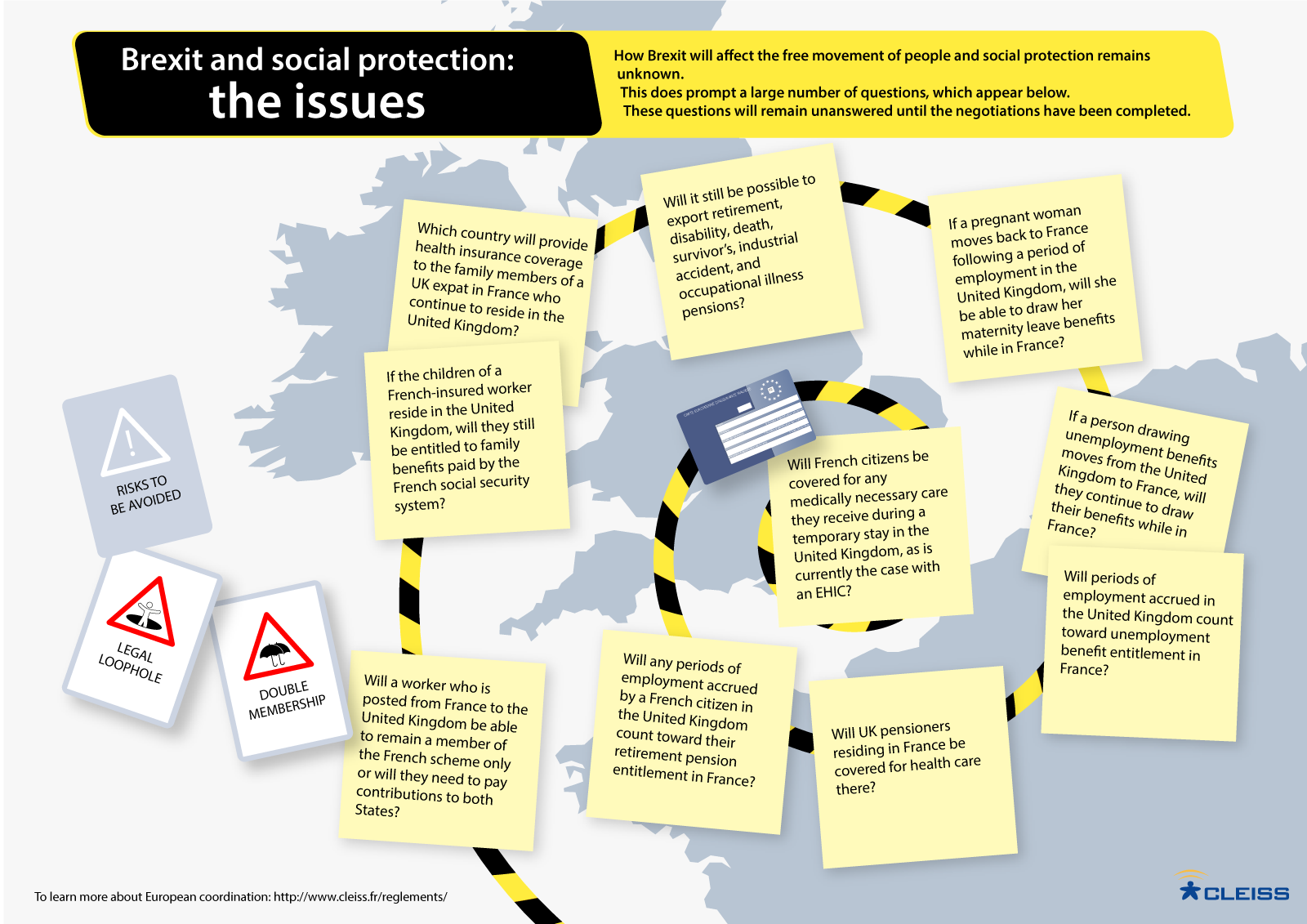 What's at stake in the negotiations on social protection: Brexit could put an end to the coordination mechanisms which have been established by the regulations that currently apply between the United Kingdom and its European partners.
What's at stake in the negotiations on social protection: Brexit could put an end to the coordination mechanisms which have been established by the regulations that currently apply between the United Kingdom and its European partners.
On November 25, 2018, the EU and the United Kingdom reached a withdrawal agreement. This agreement allows for a transition period ending on December 31, 2020, during which the United Kingdom, henceforth a non-EU State, would continue to apply all European legislation and would have access to the common market and the Customs Union.
However, it would no longer have a seat on any European institutions and would no longer be involved in any decision-making processes.
This agreement is accompanied by a political declaration. This non-legally binding document paved the way toward the negotiations, in particular those on social security coordination.
To prepare France for a possible UK withdrawal without a deal, the French government has issued orders with highly specific, high-priority scopes in order to ensure continuity in certain areas which it has determined to be necessary to individuals and businesses. As an example, the Government Order on admission to and residency in France, social rights, and employment in the event of a no-deal Brexit was published in France's Official Journal dated February 7, 2019.
France's decree No. 2019-265 of April 3, 2019, which was issued pursuant to article 18 of the aforementioned order, sets forth the rules for how periods of insurance or employment that were accrued under UK legislation before Brexit and up to 6 months after the withdrawal date will be taken into account towards eligibility for and amounts of entitlements to social security benefits and unemployment insurance coverage.
At the European Council meeting of March 21, 2019, the member States agreed to postpone the date of the UK's withdrawal, which was originally scheduled for March 29. Two alternative withdrawal dates were scheduled:
In order to prepare for a possible no-deal Brexit, the European Parliament and the Council of the European Union adopted a “Regulation establishing contingency measures in the field of social security coordination following the withdrawal of the United Kingdom from the Union,” which was published in the EU's Official Journal dated March 27, 2019. This regulation is designed to safeguard the Social Security entitlements of individuals affected by Brexit: the member States will continue to apply the principles of “equality of treatment, assimilation and aggregation as laid down by Regulations (EC) No 883/2004 and (EC) No 987/2009, as well as the rules of those Regulations that are necessary to give effect to those principles, as regards persons covered, facts or events that occurred, and periods that were completed prior to the withdrawal of the United Kingdom from the Union.”
The European Council met again on April 10, 2019 for a special summit on Brexit and granted the UK a new extension (in response to Theresa May's request of April 5). The UK was given a new withdrawal deadline of October 31, 2019. The decision confirming the extension was adopted on April 11, 2019.
On October 17, 2019, EU and UK negotiators agreed to the revised withdrawal agreement (protocol on the Republic of Ireland and Northern Ireland and political declaration on the framework for the future relationship between the EU and the United Kingdom).
On October 29, 2019, the European Council accepted the United Kingdom's request and granted a 3-month extension through January 31, 2020.
On January 24, 2020, the withdrawal agreement was signed by the President of the European Council, the President of the European Commission, and the Prime Minister of the United Kingdom. It was then approved by the European Parliament on January 29.
With the withdrawal agreement ratified, the United Kingdom exited the European Union in an orderly manner at midnight on January 31, 2020, and will cease to apply EU law upon conclusion of the transition period which is scheduled to run from February 1st to December 31, 2020.
Under the terms of the withdrawal agreement, social protection rules for private citizens and businesses engaging in international mobility will remain unchanged during the transition period. This gives the parties time to lay the building blocks for the future relationship between the EU and the United Kingdom, which remains to be negotiated.
The UK prime minister wants to reach a trade deal with the EU by the end of 2020 and has repeatedly stated the desire not to extend the transition period. If that position changes, the transition period will only able to be extended once, for a period of one or two years, but that would require a joint decision by the EU and the UK by July 1st.